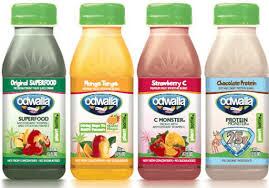“I think we’re going to see growth in sales of beverages as a whole, the upside of many billions of dollars in overall beverage sales because of the convenience and nutritional density that beverages can provide compared to complex hand-held food.”
Steltenpohl has spent his career in the healthful beverage market, founding Odwalla in 1980 in Santa Cruz, CA, with a single line of fresh squeezed orange juice. After several years of growth, the company expanded into 20-odd juice flavors and later into soymilk smoothies, fruit bars and energy bars.

“When Odwalla came out, it looked different and had a different attitude about things," he told FoodNavigator-USA.
Odwalla made other stuff look stiff
"It was more playful and speaking to a generational difference that was happening at the time. It made other stuff look stiff. We were doing stuff for the first time—discovering smoothies and carrot juice.
"We captured that zeitgeist. I was one of the early people who saw it as a branding opportunity, not just a product opportunity.”
A few years after a massive recall due to an E. Coli outbreak in 1996, Odwalla rehabilitated its brand name and regained profitability. It was sold to Coca-Cola in 2001 for $180 million—a decision that was made by the board of directors, not Steltenpohl, he said.
In 2010, Steltenpohl went back to his entrepreneurial roots, or as he calls them “intrepreneurial” (given his greater access to resources and retail channels as a 40-year industry veteran) and became CEO of non-GMO, locally sourced beverage manufacturer Califia Farms, which was founded by the growers of Cuties brand citrus.
The consolidation and acquisitions and shelf space wars are so intense
He has spent the past three years “working within the system to provide a new growth pathway” for the brand’s citrus juice line. The company has since expanded into almond milk and cold brewed coffee and is emerging into profitability, Steltenpohl said.
“The beverage world is moving so fast and the players are so big. The consolidation and acquisitions and shelf space wars are so intense that I knew launching anything less than a full-line beverage program—one, we wouldn’t get taken seriously by retailers—and two, you need a full line just to defend a brand block nowadays.
"Fortunately, I’m a little older in my career and have the resources available with the Sun Pacific cooperative of growers that enabled me to do something most younger entrepreneurs can’t do because they have to start with limited products.”
Beverage becoming a ‘food group’ decision
Since returning to the beverage industry in earnest, Steltenpohl said the landscape has become quite different. Consumers are demanding far more from their beverages than the calorie or sugar reduction of 10 years ago—though the importance of taste remains unchanged.
It’s no longer enough to “simply subtract out the bad stuff”, as consumers have a much more complex decision to make at point of purchase. That’s where a combination of the absence of negative plus addition of beneficial ingredients can make beverage a functional (albeit enjoyable) experience for consumers, and something that is considered a healthy part of the diet.
“I don’t mean ‘functionality’ in the way the industry has looked at it before, by adding a bunch of chemicals. That was the old model,” he said. “The new model is consumers are looking at beverage choice as a food group decision and they’re looking at what are they going to get—or not get, importantly—when they consume that.”
This marked shift in consumers’ attitudes about the role of beverage in their diets is being driven by three macro trends, Steltenphol said.
- Generational changes. This shift is fueled by Millennial-aged consumers, characterized by being very aware of trends, into social media, looking for something different—and smart, Steltenpohl said. “They know they’re starting off on wrong foot with sugary beverages, they understand saturated fats. Generational change has created a very different consumer, and I think very large, entrenched, multinational food companies, with their legacy products and profit structures built up, are reluctant to drive change. This creates an opportunity for entrepreneurial companies to align with upcoming generational trends.”
- Healthcare costs and general health awareness. “Obesity, food allergies, gluten, lactose—each of these things have made people look at their basic food choices through a much different lens than they did 30 or 40 years ago, when the Food Pyramid was touting meat and milk,” he said. “Now it’s almost inverted. And healthy eating is a factor of overall health. I can’t tell you what a difference it is from 30 years ago. Very smart, educated people couldn’t connect the line between what they ate and how they felt. It was a totally different attitude.”
- Environmental health issues. “Large-scale factory dairy operations are very environmentally intensive—you might even say they’re environmentally destructive,” Steltenpohl said. “In addition to the environmental impact, you have continuing cost pressure on the business model for pure dairy. There’s a squeeze in middle of higher operating costs for conventional dairy and higher consumer scrutiny for that food group—those two things are really going to drive a lot of change.”
That’s where the diversity and creativity of entrepreneurs targeting usage occasion and function will drive the category, he noted. The so-called “disruptive”, startup brands will lead the way, though the big brands should never be discounted.
“Once big companies really make a commitment to plant-based beverages or other functional categories, they’re going to drive a lot of volume.”
